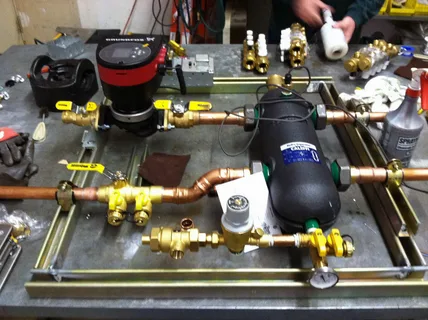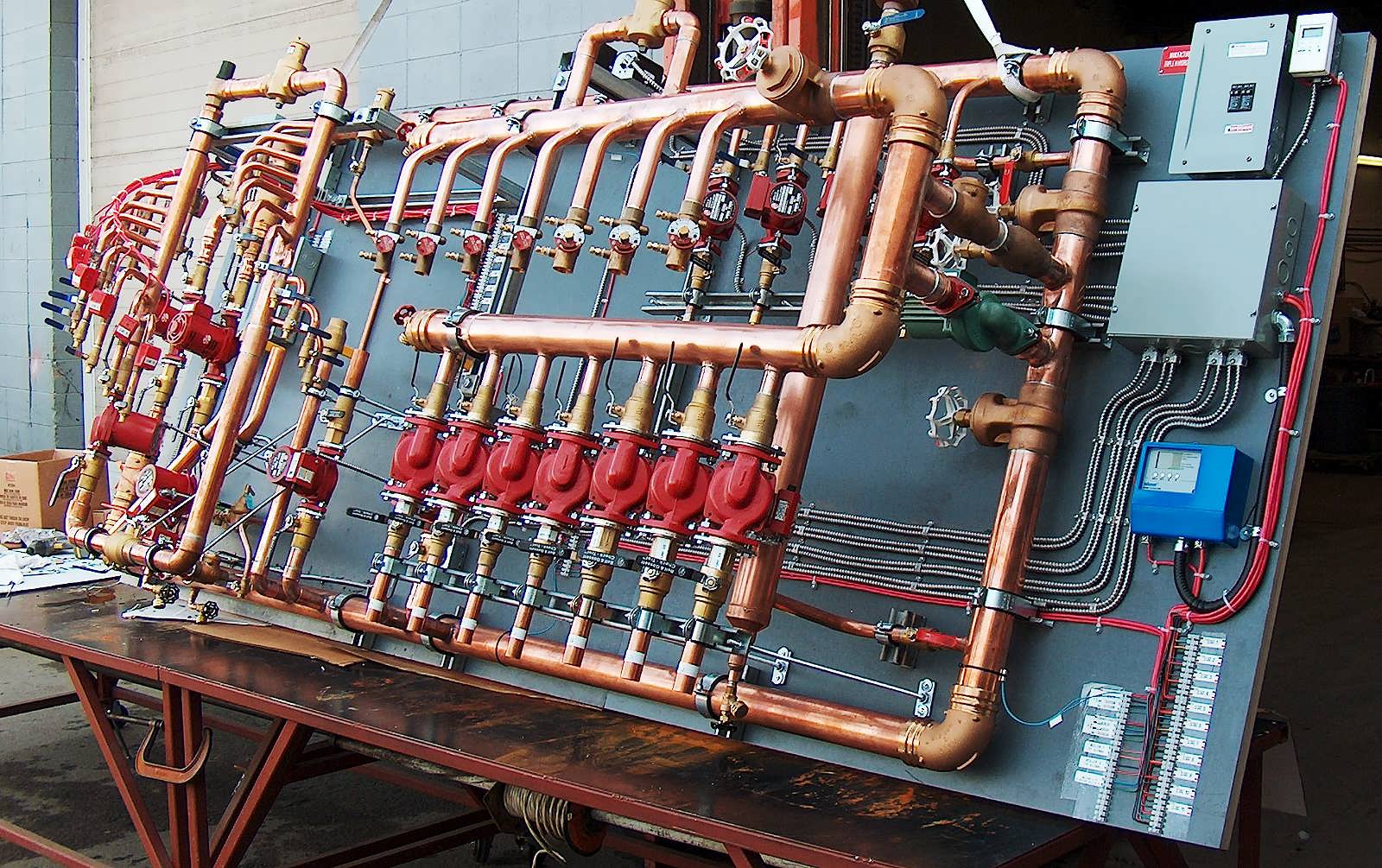Are you tired of uneven heating in your home during the colder months? Have you been looking for a more efficient way to keep your living space warm and comfortable while also saving on energy bills? Hydronic heating panels might be the perfect solution for you. This guide will explore the benefits of hydronic panels, how to choose the right system for your home, the installation process, cost analysis, maintenance tips, and more. Say goodbye to chilly rooms and hello to consistent warmth and savings with heating panels.
Understanding Heating Panels
Hydronic panels utilise a sophisticated system of circulating heated water through a series of pipes located within the floors, walls, or ceilings to achieve an optimal distribution of warmth. This method, known as radiant heating, fundamentally alters how heat is delivered within a space. Instead of directly heating the air, the panels elevate the temperature of surfaces within a room. These surfaces, in turn, emit warmth, creating a gentle and uniform heating environment. This approach enhances comfort levels and contributes to a healthier atmosphere by minimising the circulation of dust and allergens often associated with conventional forced-air systems.
Hydronic panels operate and efficiently. Water is heated to the desired temperature using a boiler or heat pump and then propelled through the network of pipes. This heated water radiates warmth to the surrounding structure, gradually releasing heat into the room. The system’s efficiency is further maximised when coupled with modern, energy-efficient boilers or renewable energy sources, such as solar thermal panels, making it an environmentally friendly heating solution.
Crucially, hydronic panels’ design flexibility allows for customisation to meet specific heating demands. Whether integrated into the building phase or retrofitted, these panels can be adapted to suit various architectural styles and property sizes, making them an increasingly popular choice for those seeking a comfortable, energy-efficient, and sustainable heating solution.
 The Benefits of Hydronic Heating for Your Home
The Benefits of Hydronic Heating for Your Home
Hydronic heating present many advantages for homeowners seeking an efficient, comfortable heating solution. Primarily, these systems deliver unparalleled thermal comfort by ensuring heat is distributed evenly across the space, eliminating the discomfort of hot and cold patches prevalent in traditional heating methods. This even distribution is achieved through radiant heating, which warms objects and surfaces in a room rather than the air, resulting in a more natural and comfortable warmth.
Moreover, heating panels are celebrated for their energy efficiency. Operating at lower temperatures than standard heating systems yet providing the same level of warmth, these panels require less energy, which can lead to significant reductions in utility bills. The ability to zone the heating—controlling the temperature in different areas of the home independently—further enhances energy efficiency and personal comfort.
Another notable benefit is the improved air quality within the home. As these systems do not rely on blowing air, there is minimal movement of dust and allergens, making them a preferable choice for those with allergies or respiratory issues. The absence of fans and blowers also contributes to a quieter living environment, as the operation is virtually silent.
Additionally, hydronic panels’ versatility allows them to be integrated into any design aesthetic, providing warmth without compromising the style of your home. Whether installed on the floors, walls, or ceilings, these panels can be tailored to meet any homeowner’s specific needs and preferences, making them a highly adaptable heating solution.
How to Choose the Right Hydronic Panels
Selecting the appropriate hydronic panels for your home depends on various critical considerations. The dimensions of your property play a paramount role, as they directly influence the capacity and type of panels required to achieve efficient and uniform heating. Begin by evaluating the space to be heated, considering both the square footage and the layout. This assessment will guide you in determining whether floor-mounted, wall-mounted, or ceiling-mounted panels are most suitable for your specific needs.
Budget is another significant factor; investing in a hydronic heating system involves upfront costs and long-term savings. It’s essential to balance your initial investment with the potential for reduced energy bills in the future. Exploring different brands and models can help you find a system that offers the best value for money without compromising quality or efficiency.
Additionally, bear in mind any unique heating requirements your home might have. For instance, areas with higher ceilings may benefit more from ceiling-mounted panels, while spaces with limited wall space find a floor-mounted system more practical. Consulting with a heating specialist can provide bespoke advice tailored to your home’s characteristics, ensuring you choose the most effective and efficient hydronic panels for your living space.
Installation Process of Hydronic Heating Panels
Installing hydronic heating panels requires a systematic approach involving several key steps to ensure optimal functioning. Initially, the premises are surveyed to ascertain the best panel locations and pipework routing. This stage is crucial for determining the layout that will deliver uniform heating across the designated spaces. Following this, the pipework installation begins, which might involve lifting floors or creating channels in walls, depending on whether the system is being installed in a new build or retrofitted into an existing property.
The panels are then mounted and connected to the pipework, ensuring a seamless integration with the heating source, be it a boiler or heat pump. Finally, the system is filled with water, and a thorough testing phase is undertaken to verify that the water circulates correctly and that there are no leaks. This process must be overseen by professionals with expertise in hydronic heating systems to guarantee efficiency and safety. Upon completion, homeowners are briefed on the operation and basic maintenance of the system to maintain its performance over time.
Cost Analysis and Savings with Hydronic Heating
The upfront investment in hydronic panels, whilst higher than conventional heating systems, sets the stage for appreciable savings on energy expenditure over time. These systems operate under lower temperatures yet provide equivalent warmth, translating to reduced energy demands. This efficiency is a cornerstone of hydronic heating’s value proposition, potentially lowering utility bills significantly.
Eliminating your heating further optimises energy use, allowing for the precise control of temperatures in various sections of the home, thereby avoiding the wasteful heating of unoccupied spaces. Considering the long-term financial benefits and the initial setup cost is essential. Engaging in a detailed cost-benefit analysis, considering potential savings on energy bills, will elucidate the economic viability of transitioning to hydronic heating for your home.
In addition, integrating renewable energy sources can further decrease operational costs, enhancing the system’s sustainability and financial advantages.
Maintenance Tips for Your Hydronic Heating System
Regular maintenance is key to ensuring your hydronic heating system operates at peak efficiency and enjoys a prolonged lifespan. Undertaking a few simple checks and tasks can significantly contribute to its smooth functioning. Firstly, monitor the system for any signs of leaks. Even minor leaks can lead to a loss of efficiency and, if left unaddressed, may damage your home. Inspecting the pipes periodically for corrosion or wear and tear is also advisable, as these could lead to leaks or impair the system’s performance.
Another vital aspect of maintenance is verifying that the boiler or heat pump is in good working order. This includes checking for error codes, ensuring the pressure levels are within the recommended range, and listening for unusual noises during operation. Keeping the boiler or heat pump clean from debris or dust will also aid in its efficiency.
Arranging for an annual inspection by a qualified professional should not be overlooked. They can carry out a more thorough examination of the system, including testing the efficiency of the heating panels and ensuring the water circulating through the pipes maintains the correct chemical balance. This professional check can identify potential issues before they escalate into costly repairs, safeguarding your investment in a hydronic heating system. Regular maintenance not only secures the system’s reliability but also upholds the comfort and warmth of your home.
Hydronic Panels vs Traditional Heating Methods
Hydronic panels are a superior choice compared to traditional heating systems, such as forced-air furnaces for several reasons. Unlike forced-air systems that can result in uneven heating and drafts, hydronic panels ensure a consistent distribution of warmth through radiant heating, eliminating cold spots in the home. This method of heating not only enhances comfort but is also more energy-efficient.
Since hydronic systems can operate at lower temperatures while providing ample warmth, they consume less energy, contributing to lower utility bills. Additionally, hydronic heating minimises the circulation of dust and allergens, a common issue with forced-air systems that rely on blowing air through ductwork. This makes hydronic panels a healthier option, particularly for individuals with respiratory concerns or allergies.
The quiet operation of hydronic heating, devoid of the noise associated with the fans and blowers of traditional systems, further underscores its appeal, offering a peaceful and tranquil home environment.
Conclusion
Embracing hydronic heating panels marks a forward-thinking approach to home heating, marrying efficiency with comfort seamlessly. This guide has navigated the essential facets of integrating such a system into your living space, highlighting its advantages over conventional heating methods and underscoring the potential for energy savings and enhanced environmental stewardship. By choosing a system tailored to the specific demands of your property and adhering to recommended maintenance practices, you ensure the longevity and efficacy of your heating solution. As the landscape of home heating evolves, hydronic panels stand out as a testament to innovation, sustainability, and homeowner satisfaction. Engaging with this technology represents an upgrade to your heating system and a commitment to a modern, healthier home environment.
FAQS
Q: How long does it take to install a hydronic heating panel system?
A: The installation timeframe can vary based on the size of your home and the system’s complexity. Typically, a complete installation takes a few days to a week, but planning and preparation stages could extend this period. Consulting with your installation provider will give you a more accurate timeline.
Q: Can hydronic heating panels be used with any floor?
A: Yes, hydronic heating panels can be compatible with various flooring types, including tile, hardwood, laminate, and carpet. However, the heat output and efficiency can vary depending on the flooring material’s thermal conductivity. Discussing options with a specialist is important to ensure optimal compatibility and performance.
Q: Are there any government incentives for installing hydronic panels?
A: In some regions, grants, rebates, or tax incentives may be available for installing energy-efficient heating systems like hydronic panels. Check with local authorities or energy agencies to see what incentives are available in your area.
Q: Can I control the temperature of different rooms independently?
A: One of the advantages of hydronic heating systems is the ability to zone your heating. This means you can control the temperature in different rooms or areas independently, providing energy savings and personalised comfort levels throughout your home.
Q: How often does a hydronic heating system need maintenance?
A: Regular maintenance is recommended at least once a year to ensure optimal performance and longevity of your system. This should ideally be performed by a qualified heating engineer who can inspect the system, test for efficiency, and address any potential issues.
| Other Good Articles to Read |
| Gabrielle Blogs |
| Jason Toff Blogs |
| Thumb Blogs |
| Blog Shifter |
| Social Bookmarking Blogs |
| Blog Solidaire |
| Michael Coyne Blog |
| Born Free Blog |
| Oz Blog Hosting |
| Indepth News |
| Link Forum |
| Related Business Listings |
| Contact Directory |
| Local Business Profiles |



